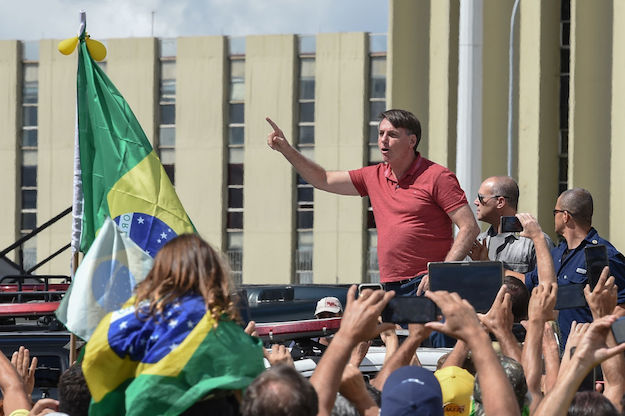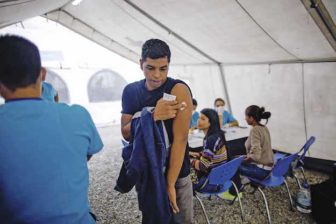Brazil is witnessing unprecedented scenes of protestors raging against lockdowns in front of hospitals full of COVID-19 patients fighting for their lives. Yet the extreme politicization of publich health in Brazil brings uncanny echoes from the past.
In 1904, Rio de Janeiro was Brazil’s capital and its most important city. That year, the federal government enacted a law making smallpox vaccinations mandatory – and in November, shortly after officials explained how they would enforce the new law, the city erupted in riots, with thousands of people fighting police and the army in the streets of downtown.
The vaccine revolt opened the door to political unrest and an attempted military coup. Newspapers reported 23 deaths, with dozens wounded and about 1,000 people arrested. Rumors spread that the police were brutalizing detainees; an unknown number of those arrested were executed or sent to Acre, a territory in the Amazon on the border with Bolivia that Brazil had recently annexed.
Health authorities at the time portrayed the rioters as an ignorant and superstitious mob, fearful of modern science. Smallpox vaccination was one of several health care campaigns launched by then-President Francisco de Paula Rodrigues Alves. Those also included actions against yellow fever and the bubonic plague, carried out with determination and, as it turned out, widespread state violence.
Much like today, the public health backlash in 1904 had a deep political and economic component.
Since at least the mid-19th century, officials considered poor and overpopulated dwellings conducive to the spread of epidemics. Yet their systematic demolition was not accompanied by the construction of affordable alternative housing
Ostensibly in the name of public health, authorities at the time had begun to implemenent major urban changes in Rio, particularly through the demolition of buildings and slums that housed the poor in the downtown area and its surroundings. Since at least the mid-19th century, officials considered poor and overpopulated dwellings conducive to the spread of epidemics. Yet their systematic demolition was not accompanied by the construction of affordable alternative housing. Opponents of these policies labeled them “sanitary despotism.”
Soon, political forces used the disputes over the vaccinations to try to topple Alves through a military uprising. The effort had the decisive backing of at least two major local newspapers and some prominent Congressmen, but ultimately failed.
The opposition to vaccination was deeply rooted in beliefs and practices at the time. One was positivism, a philosophical current highly popular in intellectual and military circles. The Positivist Church saw compulsory smallpox vaccination as a violation of both individual rights and the natural rules of social Darwinism — that is, the concept of survival of the fittest applied to societies. Meanwhile, labor unions argued that the public health push was exacerbating Rio’s housing crisis.
To be sure, the population had good reasons to be skeptical of the promises of medical science. Yellow fever, cholera, smallpox and tuberculosis had ravaged Rio throughout the second half of the 19th century. Health authorities had failed or achieved limited success in containing these scourges.
Smallpox was a case in point. The city had its first vaccination service established in 1811, but mostly to vaccinate enslaved Africans that had recently arrived. Families that could afford to do so were vaccinated at home by private doctors. But by the mid-19th century, many started to question the efficacy and safety of smallpox vaccines. The vaccine lymph frequently deteriorated during transportation and, in some cases, transmitted syphilis or other diseases. It took a long time for doctors to understand that immunity was not permanent and patients needed to be revaccinated every few years.
To complicate matters further, there is evidence that popular healers practiced so-called variolation – the inoculation of healthy individuals with contaminated pus, in an attempt to promote herd immunity. The African-Brazilian religion of Candomblé had a deity devoted to smallpox, and its practitioners trusted their own rituals to deal with the disease, resisting the interference of medical doctors. During the 1904 riots, some Afro-Brazilian neighborhoods became the most important pockets of resistance against security forces.
All these factors combined to produce a tragedy. The public vaccination service came to a halt after the 1904 riots. Four years later, Rio had perhaps its worst smallpox epidemic, killing 9,000 in just a few months.
The politics and the victims
Historians like to say that history does not repeat itself, but analogies and comparisons between seemingly disparate historical contexts may provide important insights about past and present. It may thus be useful to ask what aspects of the 1904 riots in Rio can help us reflect on the challenges of the present pandemic?
The question of the politicization of public health through its conflation with petty partisan bickering, including attempts to destabilize democratic institutions, comes to mind. In 1904, medical science and investment in public health had made the smallpox vaccination service in Rio more reliable than it had ever been. But prominent politicians weaponized public health to fight each other, confounding the public and undermining support for the vaccination campaign.
In today’s Brazil – much like in the U.S. – the president is a main opponent of measures recommended by his own health experts. Jair Bolsonaro preaches daily against social distancing. Donald Trump has promoted chloroquine and scheduled the reopening of the U.S. economy, disregarding medical advice.
Bolsonaro and Trump’s first reaction was to deny the threat of COVID-19 – a move coherent with their records of climate change denial, antagonism toward universities, and a loose relationship with the truth.
Despite the completely different historical contexts, skepticism regarding science and expertise was also an important aspect of the 1904 riots in Rio. Bolsonaro and Trump’s first reaction was to deny the threat of COVID-19 – a move coherent with their records of climate change denial, antagonism toward universities, and a loose relationship with the truth.
Brazil and the U.S. also share a history of slavery and racism, which are heightened when politics meet epidemics. As their presidents engage in counter-information and undermine containment measures, they increase the vulnerability of black and poor populations – who are the most unassisted and disproportionately exposed, particularly in the case of a premature return to so-called normal life. The main victims of 1904 and of 2020 look disturbingly similar.
—
Chalhoub is a Professor of History and of African and African American Studies at Harvard University.
—
This article was updated to fix an editing error.






